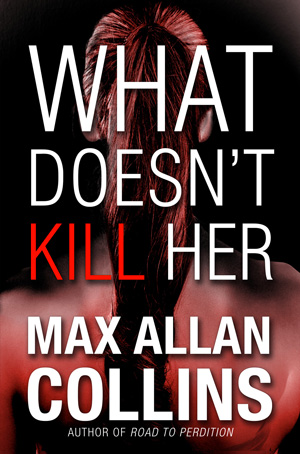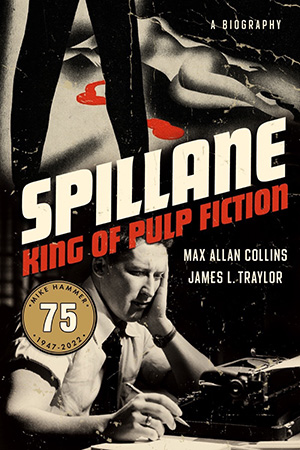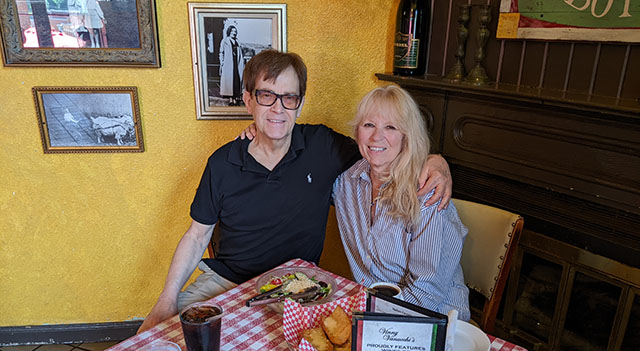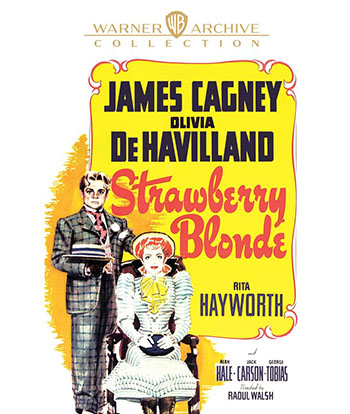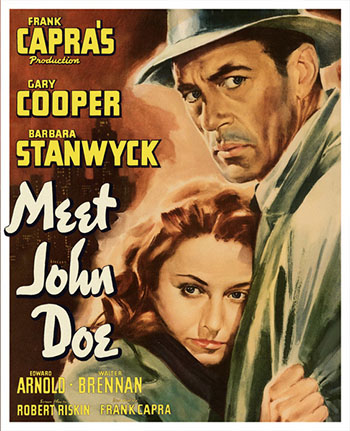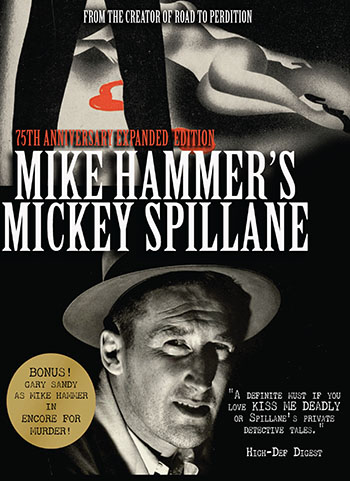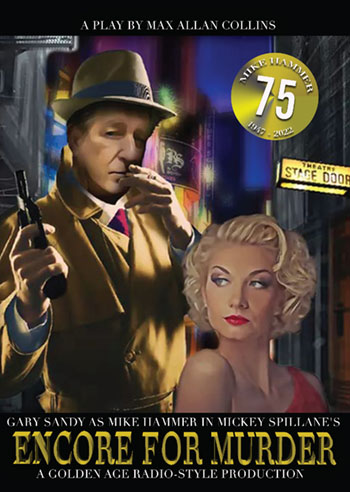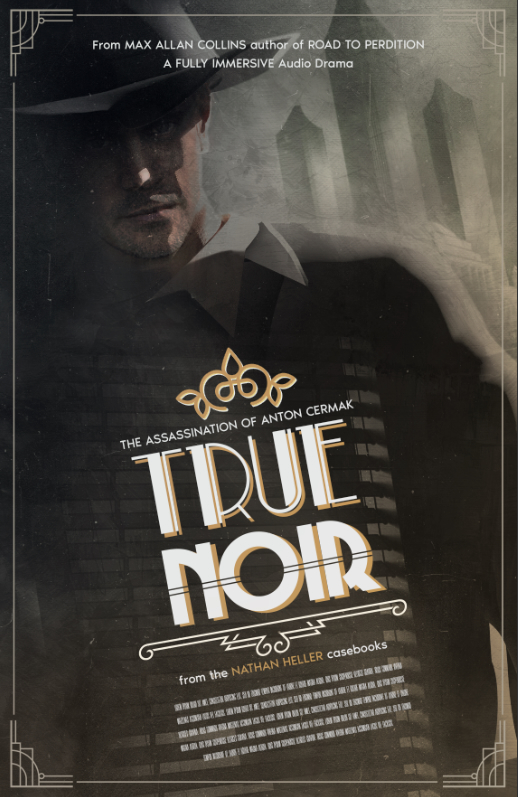Before I get into the topic of the day, let me express my concern and support for my friends in the Los Angeles area over the cataclysmic fires that have destroyed so much. My friend Robert Meyer Burnett, who at this writing is safe, has spoken eloquently on his YouTube channel (see his recent Observations) about the disaster and its impact. To me, and to many, Los Angeles is the capitol city of entertainment present and past, and thinking about not just the homes and businesses, but landmark structures, that have been lost is staggering, as are the terrible losses to the populace.
I wish I didn’t hate the phrase “our hearts and prayers go out” so much, since those words are just a reflexive go-to in so many situations; but I wish I had better words to replace them.
Last week I discussed collaboration here, but I did not mention the most unusual and important collaboration I’ve been half of.
I would think most people who stop by here are well-aware of my love for Mickey Spillane the man and Mickey Spillane the writer (he hated “author”).
It has been the greatest privilege, the high honor, of my career for Mickey to have entrusted me with completing various works-in-progress and novels-in-consideration of his to fruition. The thirteen Mike Hammer novels Mickey wrote have been expanded by fourteen more novels by Spillane/Collins. Seeing my name on a book jacket next to him remains something I can barely compute.
I’ve told this story many times, so I’ll keep it brief. Mickey, who was dying of pancreatic cancer, called me and asked me if I’d complete for him The Goliath Bone, designed to be his last Mike Hammer, should he not be able to do so. I of course said I would, if that became necessary. Shortly after, he instructed his wife Jane to conduct “a treasure hunt” in his three offices at his home in South Carolina and turn everything she found over to me.
That treasure hunt, a few days after Mickey’s funeral, was conducted not just by Jane but by Barb and me. Stacks of manuscript were assembled on the Spillane dining room table, and the three of us began to sort.
Among the manuscripts and other typescript and occasional hand-written material were half a dozen substantial Hammer manuscripts – eighty to one-hundred double-spaced pages each, as well as two non-Hammer novels well in progress, Dead Street and The Consummata (the sequel to his The Delta Factor). Additionally, the completed screenplay of The Saga of Caleb York, never produced, became a novel, The Legend of Caleb York, followed by five more York novels signed Spillane and Collins, the only books I shared with Mickey’s byline that he didn’t write some of, though they were drawn from material in the unproduced screenplay. I also turned his screenplay The Menace into a novel.
The play Encore for Murder – which appeared as a Stacy Keach full-cast audio drama – later performed in Owensboro, Kentucky; Clearwater Florida; and my home of Muscatine, Iowa – was based on a Spillane synopsis. I had planned to write a novel version but that never happened. Encore does exist, with Gary Sandy as Hammer, as a special feature on the Mike Hammer’s Mickey Spillane blu-ray and as a freestanding DVD. Gary played Hammer in the Owensboro and Clearwater productions, as well.
Another screenplay, The Green Woman, with a science-fiction/fantasy aspect, awaits novelization, if time and a market present themselves. A number of Spillane fragments, some fairly substantial, may one day serve for novels or short stories. But the demand will have to be there.
In Spillane: King of Pulp Fiction, the biography that James L. Traylor and I wrote about Mickey, we included supplementary material at the end of the book. My essay “Completing Mickey Spillane” discussed each of the Spillane/Collins Hammer novels and how I approached them in the writing.
Again, there were six substantial manuscripts, literally novels in progress. Then came a number of shorter but somewhat substantial fragments in varying shape, usually a chapter or two or three, and sometimes endings, and in some instances character and plot notes. The last three novels I wrote that were discussed in “Completing Mickey Spillane” came from (unproduced) synopses Mickey did for the Stacy Keach television series (Murder, My Love and Masquerade for Murder) and Kill Me, Darling was developed from several radio and television scripts (unproduced versions of the same otherwise unpublished story).
The remaining two Hammer novels, which had not been completed at the time Spillane: King of Pulp Fiction was published, are Dig Two Graves and Baby, It’s Murder, the former developed from a couple of chapters that appeared to be a few chapters into the story – Mickey’s beginning was not among his papers.
Which brings us to the final Mike Hammer novel of the canon, Baby, It’s Murder, to be published on March 4, 2025 (a day before my 77th birthday). It derives from a two-chapter fragment in Mickey’s files. I made the story a flashback, as I needed…or at least wanted…to give the series some finality. Let’s just say the wraparound chapters (one fore, one aft) take place at a funeral.
Those of you who have followed these books, and have not dismissed them as “continuations,” as some have despite the actual Spillane content they include, I give my deepest thanks. If you haven’t read them, or read the first few and drifted away, I will say only that these are all books of which I am very proud. My greatest thanks goes to Mickey. And to Jane.
If you are interested in these books, I would suggest snagging them soon. The last few books have had fairly short print runs, and maybe half a dozen entries ago, Titan stopped publishing trade paperback reprints of the Spillane/Collins titles.
Are these the last Mike Hammer books? Or anyway the last Mike Hammer books that would contain real Spillane material? Possibly. At my age, how many projects I have ahead of me is unknown. I still have two Hammer fragments I did not complete…yet. They may become short stories, or they may become novels, if the long-promised Mike Hammer film from Skydance becomes a reality.
There is one manuscript waiting for a publisher (though I haven’t approached any as yet). Mickey wrote a draft of a Mike Danger science-fiction novel; my draft has never been completed. Mickey and I discussed the possibility that if the Miramax movie option didn’t come to fruition (and it’s long since passed) we might convert it into a Hammer.
Danger, of course, was Mickey’s original name for Hammer (when he was prepping to do it as a comic book in the late ‘40s). He and I revived it for a comic book company, Big Entertainment, where it had a three-year run (and scored a contract with the Weinsteins). The science fiction aspect of the story has Danger (now Hammer) being sent into the future. It’s a kind of Spillane take on the H.G. Wells Time Machine.
If I can find the right market, that one will be out there as a non-canonical Hammer. Mickey had an idea for a sequel, too, also with an s-f aspect.
If you want to know the many reasons for this famous, bestselling writer (never author!) leaving so many manuscripts unfinished, it’s all spelled out in Spillane: King of Pulp Fiction. For those you waiting for the trade paperback of that one, none is currently scheduled, though the book is staying in print.
One final fun fact: my grandmother’s maiden name was Spellman. And Spillane and Spellman are apparently different versions of the same name.
This week I recorded the rest of the True Noir “History Behind the Mystery” episodes. If you have signed up for True Noir, now’s the time: go to truenoir.co.
And here’s the second “History Behind the Mystery.”
Here’s an article on Tom Hanks and his “comic book movie” (Road to Perdition).
M.A.C.












